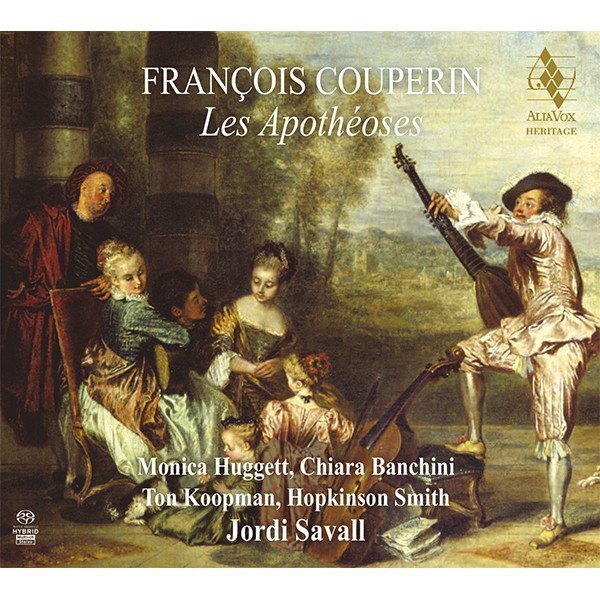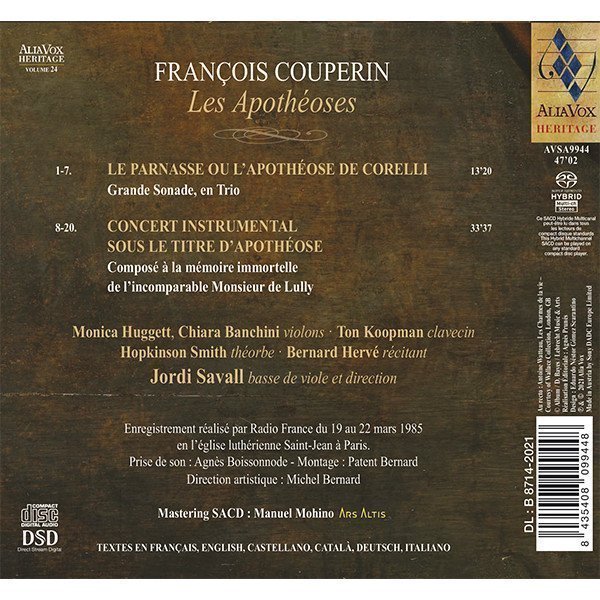FRANÇOIS COUPERIN
Les Apothéoses
Jordi Savall
Alia Vox Heritage
15,99€
Couperin is too easily seen as the tender, graceful and somewhat melancholy composer, whose soft-toned palette was the same as that which served the brush of Watteau. There was another Couperin who was a master of humour and whose claws were sharp. And yet another who was a musician involved in the aesthetic battles of this time and in the avant-garde. There were great battles, like the one to which the lovers of Italy rallied, and which led him to write, at the age of twenty-two or twenty-four, the first sonatas to appear in France. There were skirmishes, like that in which the sworn masters of the guild of minstrels opposed the royal musicians. In each case we find him participating zealously and actively – but also translating his own positions into music with his characteristic skill and lighthearted humour.
ALIA VOX AVSA9944
Heritage
CD : 47,02
FRANÇOIS COUPERIN
Les Apothéoses
CD
LE PARNASSE OU L’APOTHÉOSE DE CORELLI
Grande Sonade, en Trio
- 1.Corelli au piéd du Parnasse
- 2.Corelli, charmé de la bonne réception
- 3.Corelli buvant à la Source D’Hypocrêne
- 4.Enthouziasme de Corelli
- 5.Corelli, aprés son Enthouziasme
- 6.Les Muses reveillent Corelli
- 5.Remerciment de Corelli (gayement)
CONCERT INSTRUMENTAL SOUS LE TITRE D’APOTHEOSE
Composé à la mémoire immortelle
de l’incomparable Monsieur de Lully
- 1.Lully aux Champs Elysés
- 2.Air pour les mêmes (gracieusement)
- 3.Vol de Mercure aux Champs Elysés
- 4.Descente d’Apollon
- 5.Rumeur souteraine
- 6.Plaintes des mêmes
- 7.Enlévement de Lulli au Parnasse
- 8.Acueil entre doux et agard
- 9.Remerciment de Lulli à Apollon
- 10.Apollon persuade Lulli et Corelli
- 11.Air léger pour deux violons
- 12.Corelli, aprés son Enthouziasme
- 13.Second air. Corelli
- 14.La Paix du Parnasse (gayement)
Monica Huggett, Chiara Banchini violons
Ton Koopman clavecin
Hopkinson Smith théorbe · Bernard Hervé récitant
Jordi Savall basse de viole et direction
Enregistrement réalisé par Radio France du 19 au 22 mars 1985 en l’église luthérienne Saint-Jean à Paris. Prise de son : Agnès Boissonnode – Montage : Patent Bernard
Direction artistique : Michel Bernard
Mastering SACD : Manuel Mohino.
François Couperin
Les Apothéoses
Couperin is too easily seen as the tender, graceful and somewhat melancholy composer, whose soft-toned palette was the same as that which served the brush of Watteau. There was another Couperin who was a master of humour and whose claws were sharp. And yet another who was a musician involved in the aesthetic battles of this time and in the avant-garde. There were great battles, like the one to which the lovers of Italy rallied, and which led him to write, at the age of twenty-two or twenty-four, the first sonatas to appear in France. There were skirmishes, like that in which the sworn masters of the guild of minstrels opposed the royal musicians. In each case we find him participating zealously and actively – but also translating his own positions into music with his characteristic skill and lighthearted humour.
The battle between the Muses – the Italian Muse and the French Muse – had fired up the whole of the seventeenth century, whose history was a vast battle-field in which the Italian troops led by Cavalli or Rossi under the banner of Mazarin advanced and were repulsed by the supporters of the “ballets de Cour”, with tactical withdrawals from the composers of the “airs de cour” and counter-marches from the virtuosi, until the final victory of the renegade Lully, who betrayed his side, seizing the French banner after having changed to a y the Italian ending of his name. This aesthetic struggle should not be taken lightly: it was a serious matter which often affected the very destiny of French art. When Couperin was born, a forced truce succeeded in turning back for ever the transalpine invaders. Lully had his unquestioning supporters, his fanatics. But secretly Italy was re-arming hers, and the early years of the eighteenth century would see Italians and lovers of the beauties of Italy entering the fray again.
+ information in the CD booklet
PHILIPPE BEAUSSANT
Translated by Frank Dobbins








Share